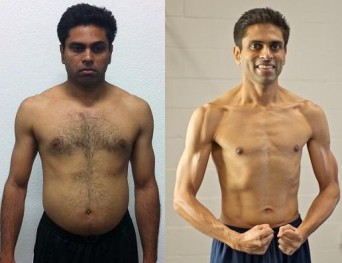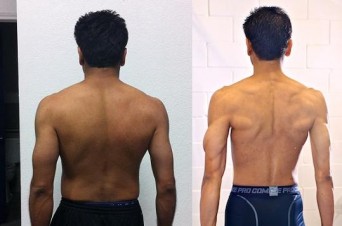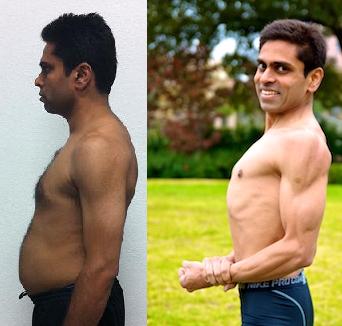Today we bring you an interview with Vivek. Vivek placed 3rd in the latest Adonis Index Contest in the Transformation category.
Vivek started with no experience or knowledge about exercises whatsoever. If you told him that bench press is for building bigger legs, he would probably believe you.
From a diet stand point it wasn’t so much different. Vivek is vegetarian, but he had no idea what any of the diet claims meant. Calories were basically just something the brand put on the label along with the logo.
Until 2011 dieting and exercising were unknown concepts for him.
Finally he decided to get in shape and lose some weight. He went with the conventional fitness approach and started eating “healthier food“. For two months he was basically eating brown rice, fruits and vegetables. However, since he wasn’t paying any attention to calories, he didn’t lose any weight at all. He was basically eating the same amount of calories, but from different sources of food and so called healthy sources. This “healthy eating” made absolutely no difference in how he felt or how much he weighed.
Like he said, Vivek wasn’t obese, but he was a bit overweight and needed to lose a few pounds and since eating ‘healthy’ wasn’t working, he kept looking for something different.
What Does an iPhone and Your Body Have in Common?
Vivek has an IT company, so working with software and technology he understands that the golden ratio is an important aspect in developing any application and that aesthetics are the key. Just take an iPhone, you would have a really hard time finding a phone that would be more aesthetically pleasing than the one from Apple. And it’s no coincidence either. The developers used the concept of a golden ratio in the development process. Same ratio that Vivek uses. Same ratio that Adonis Index workouts are designed to shape your body into.
When he stumbled across the Adonis Index he was excited because somebody actually quantified and put some science around the concept of aesthetics, took concepts he knew and applied them to building the ideal body shape.
Seeing the same concept he used in technology development, for shaping his body was incredible revelation to him and he immediately knew it made sense.
He started studying the program and implementing the advice. The implementing part is important, because you don’t learn by gaining more knowledge, you learn when you change your behavior and take action.
Learn to Use the Metrics
Vivek made an interesting observation, and that is people have a poor understanding of how to use metrics, they either don’t use them at all, or they don’t use them correctly.
He created a spreadsheet, tracked what he ate and realized that eating “healthy” is not an answer. Despite what the fitness magazines, personal trainers, dietitians and other “certified experts” say, in order to lose weight you can eat whatever you like, but you have to stay in a caloric deficit.
Eat a balanced diet, with lot’s of vegetables, but stay in caloric deficit, then you will lose weight, the answer is not by eating some magic, “healthy” food.
Next thing is that your daily fluctuation will show on the scale, so the only way to know whether you are progressing or not is to measure your weight on a weekly basis. And that’s exactly what Vivek did, he looked at what he ate on weekly basis only.
He calculated his RMR multiplied it by seven and had a number of calories he burned each week without any additional exercise. And for every pound of fat he wanted to lose he would subtract 3500 from this number, being left with the calorie budget for that given week.
At the beginning he pressed for a larger deficit when he had the most fat to lose and ate really low calories the first few weeks.
It was way easier and simpler and the only thing he did was to log what he ate. He didn’t eat six meals a day, didn’t over-consume protein, didn’t count macro-nutrients, didn’t weigh food, didn’t cook all of his meals at home, non of those, just ate lower calories.
He knew that it was just a guesstimate and that there will be errors in his calculations and in what is on the food label. In order to find out how many calories her was burning he even got his RMR clinically measured. This test only cost around $100.
Now he knew the hard numbers and could work from there.
And if you though that other people knew what he was doing, you would be wrong.
Are you anxious about telling other people? Are you afraid of what they might think of your goals or approach? Well, you don’t have tell them. They won’t even notice.
Vivek didn’t tell anyone what he was doing, all people saw was the end result.
One of his goals was to be able to have a good social life while doing all of this. He didn’t want to look weird when he was out with clients or had dinner with friends.
And that’s what this approach allowed him to do. Since he could eat anything he wanted and still keep losing weight he kept this to himself and nobody knew. Then when they saw the results it seemed like magic.
Vivek made a huge transformation for this contest, but interestingly enough he actually lost 20 pounds before it even began. Before the contest started he already went from 200 to 180 pounds.
It’s about how you change, not how well you place in the contest. If you are considering entering in the next one, don’t wait start today. You will have momentum that others who wait will not have.
What seems to work the best for most people is to lose the fat first and then focus on building muscle.
Here are two points to consider when thinking about building muscle first:
- Muscle building takes time, especially if you are not in your teen years
- Your muscles won’t be visible until you lose the fat that is covering them
This is why it’s better to focus on losing fat first, get it over with as quickly as possible and build muscle afterwards.
That’s where Vivek is now. He can just eat at his maintenance level, have lots of energy and focus on pushing at a gym.
What to do to transform your physique:
- Find a pattern that works for you and stick to it
- Track whatever it is you are doing
- Analyze your progress every week
- Record your weight in the morning to keep the water and food fluctuation to minimum
- If can afford it get your RMR clinically measured
- Expect your RMR to be lower than you want it to be and don’t lie to yourself that you can actually eat more and not gain weight
- Eat normally when you are out with friends or clients and watch yourself when you are alone and nobody is looking (The opposite of what most people do)
- Be rational not emotional when it comes to success, especially building the body you want, because emotions keep you from the truth and support beliefs molded by media and marketing
- Remember that your mind will try to justify any action you take or don’t take, so take actions that will ensure your personal growth
- Be brutally honest with yourself when tracking your metrics
- Have long term and short term goals
- Deal with your problem now, later never comes and there is only so many tomorrows in your life
- Don’t deny what happens, because then you get in trouble. People that ignore the results, get in debt and gain fat
Words & phrases mentioned in the interview:
- Muscle Index – Specific calculations for measuring muscle gains
- Muscle Building Foundation aka MBF is part of the Adonis Index Workout Program
- Brad Pilon’s fat and debt analogy – Big Fat Debt
Listen to the interview here:
Podcast: Play in new window | Download


